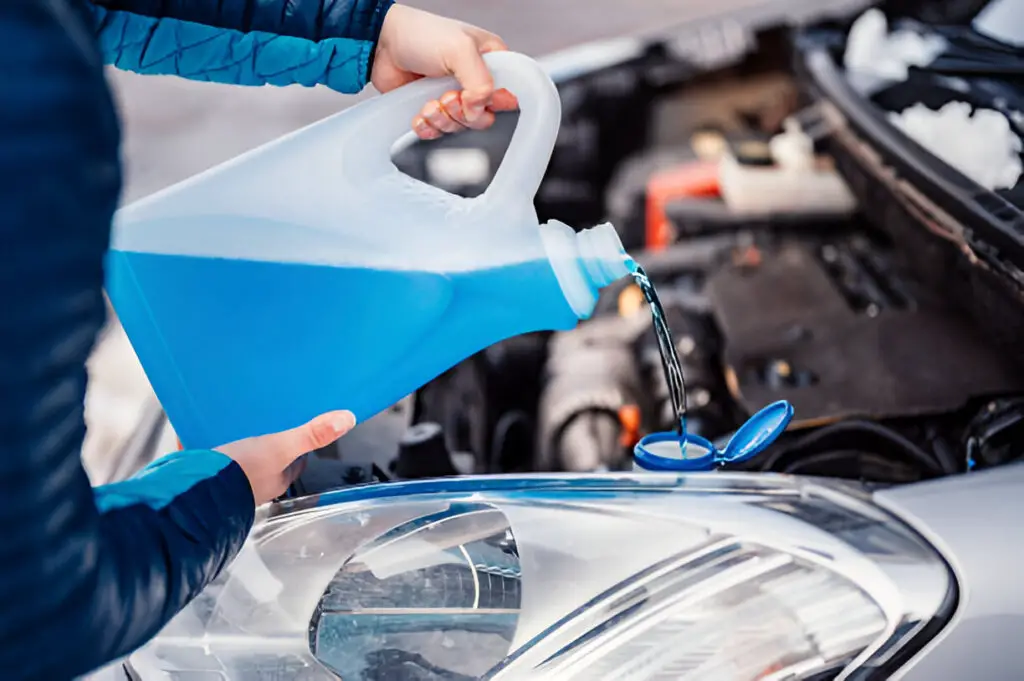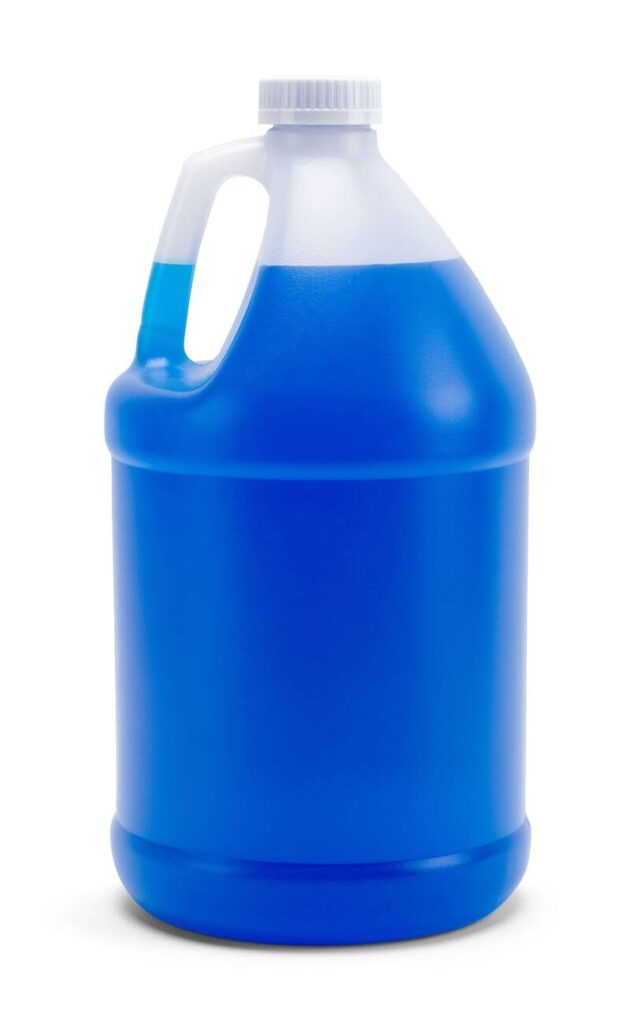Windshield washer fluid is an essential component of your vehicle’s maintenance, helping to clear debris, grime, and bugs from your windshield to ensure optimal visibility. However, many drivers are left wondering: Does windshield washer fluid freeze? And if so, what can you do to prevent it?
The simple answer is yes, windshield washer fluid can freeze, depending on the type of fluid and the temperatures it’s exposed to. In this blog post, we’ll explore why windshield washer fluid freezes, how to prevent it, and what steps to take if it happens. We’ll also look at the various types of washer fluid available and the best options for different climates.

Contents
Why Does Windshield Washer Fluid Freeze?
The freezing point of windshield washer fluid depends on the composition of the fluid. Most commercial washer fluids are water-based but also contain additives like methanol or ethylene glycol, which lower the freezing point. Pure water, for example, freezes at 32°F (0°C), but fluids with antifreeze components can resist freezing down to much lower temperatures, sometimes as low as -40°F (-40°C).
Here are some common reasons why your windshield washer fluid might freeze:
Inadequate Winter Formula
Standard windshield washer fluid, especially the summer formulas, may not contain enough antifreeze components to resist freezing in colder temperatures. These formulas are often designed for warm-weather use, and when the temperature drops, they can freeze in the reservoir, lines, or nozzles.
Dilution
If you dilute windshield washer fluid with water, either intentionally or unintentionally (for example, through condensation in the reservoir), it will raise the freezing point of the fluid, making it more susceptible to freezing.
Extreme Cold
Even winter-specific windshield washer fluid can freeze if temperatures drop below the fluid’s rated freezing point. Some winter washer fluids are rated for temperatures as low as -20°F or -30°F, but in extremely frigid environments, these fluids can still freeze.
Insufficient Circulation
In very cold weather, if the vehicle is parked for long periods without being driven, the windshield washer fluid may not circulate or heat up enough to resist freezing. This can be particularly problematic in unheated garages or outdoor parking spots.

How to Prevent Windshield Washer Fluid from Freezing
To avoid frozen windshield washer fluid, especially in winter conditions, follow these preventive measures:
Use Winter-Specific Washer Fluid
Always switch to a winter-rated windshield washer fluid before the cold season begins. These fluids are specifically formulated with antifreeze components like methanol or ethylene glycol, which prevent freezing even in sub-zero temperatures. Look for washer fluid that’s rated for the lowest temperatures expected in your area, such as fluids designed for -20°F (-30°C) or lower.
Check the Freezing Point on the Label
Before buying any windshield washer fluid, check the label for its freezing point. Many products will clearly indicate their temperature rating. Avoid using summer or all-season washer fluids in cold climates unless you’re sure they can handle the lowest temperatures in your region.
Don’t Dilute Washer Fluid
Never dilute your windshield washer fluid with water, especially during colder months. While water might seem like a harmless addition, it significantly raises the freezing point of the fluid, making it more likely to freeze in cold weather. Keep your washer fluid concentrated as per the manufacturer’s instructions.
Heated Washer Fluid Systems
Some newer vehicles come with heated washer fluid systems or heated nozzles, which help keep the washer fluid warm and prevent freezing. If your vehicle has this option, it can help prevent freezing even in extreme cold. If not, aftermarket heated systems are available that can be installed to keep the fluid circulating.
Maintain Washer Fluid Levels
Keeping your washer fluid reservoir full reduces the chance of freezing. A full reservoir allows less air exposure, which can contribute to condensation and freezing. Regularly check your fluid levels, especially in colder weather.
What to Do if the Windshield Washer Fluid Freezes
If your windshield washer fluid has already frozen, there are a few steps you can take to remedy the situation:
Thaw the Vehicle
The first thing to do is move your vehicle to a warmer area, such as a heated garage, if possible. Give the vehicle time to warm up so the washer fluid can naturally thaw. If you don’t have access to a heated garage, simply turning the car on and letting the engine run for a while can help, especially if your car has heated nozzles.
Use Warm Water (Carefully)
Another solution is to pour warm (not boiling) water over the windshield washer fluid reservoir or nozzles to help speed up the thawing process. Be cautious not to use boiling water, as it can cause the reservoir or other plastic parts to crack due to the sudden temperature change.
Add a Winter-Specific Washer Fluid
Once the frozen fluid has thawed, drain the reservoir and refill it with winter-rated windshield washer fluid. This will prevent the problem from recurring in cold weather. Be sure to use fluid rated for the temperatures you expect to encounter.
Check for Damage
After your washer fluid thaws, check for any damage to the system. Frozen washer fluid can sometimes crack the reservoir, hoses, or nozzles, leading to leaks or malfunction. If you notice windshield washer fluid leaks or poor performance, have the system inspected and repaired by a professional.
Related Article
Is Windshield Washer Fluid Flammable?
Is Windshield Washer Fluid Toxic?
Does Windshield Washer Fluid Expire?
Frequently Asked Questions
Here are some FAQs about windshield washer fluid freezing
1. Can I use water instead of windshield washer fluid?
No, water alone should not be used in your windshield washer system, especially in winter. Water has a higher freezing point than washer fluid, and it lacks the cleaning agents needed to remove grime from your windshield. In cold weather, water will freeze quickly and could damage your washer system.
2. What should I do if my windshield washer fluid freezes while driving?
If your washer fluid freezes while driving, pull over to a safe location and check the system. Try to let the engine warm up, which may help thaw the fluid. In severe cold, consider carrying a de-icer spray that can be used to clear the windshield manually until the fluid thaws.
3. Can windshield washer fluid damage my car if it freezes?
Yes, if windshield washer fluid freezes inside the reservoir, hoses, or nozzles, it can cause cracks and leaks. This can lead to costly repairs. Using winter-specific washer fluid helps prevent freezing and protects the system.
4. How often should I change my windshield washer fluid?
You should change your windshield washer fluid before the seasons change, switching to a winter-rated fluid in the fall and back to a summer or all-season formula in the spring. Always ensure your fluid matches the expected weather conditions.
5. Can I mix summer and winter windshield washer fluid?
While you can mix them in small amounts, it’s not recommended because it dilutes the antifreeze properties of the winter formula. If you have leftover summer fluid in the reservoir, it’s better to drain it and refill with winter fluid to ensure your system is protected in cold temperatures.
Conclusion
Yes, windshield washer fluid can freeze, especially if it’s not formulated for winter conditions or if it’s been diluted with water. The best way to avoid this problem is to use a winter-specific washer fluid designed to resist freezing in cold weather.
Regular maintenance will also help prevent freezing. By taking these steps, you can ensure that your windshield washer system remains fully functional, keeping your windshield clear and improving your safety on the road all year round.